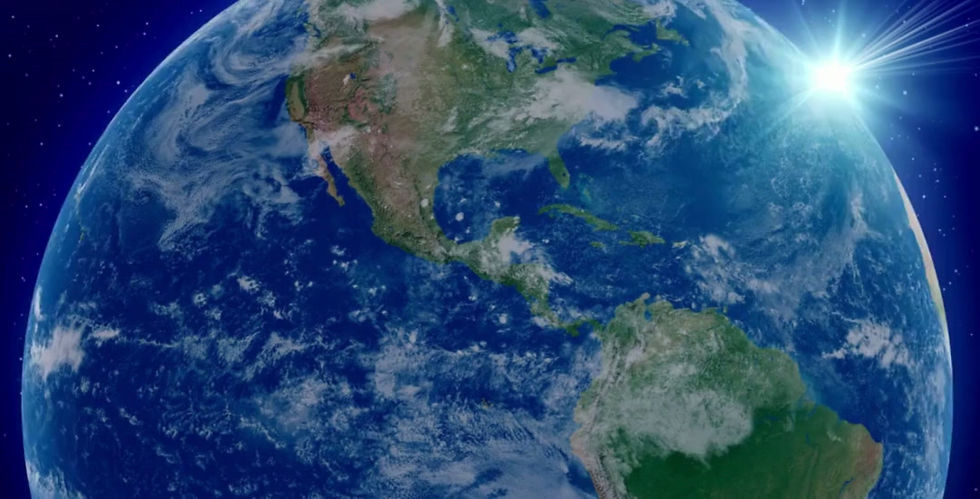

Understanding Climate Change: Our Mission for Future Generations
The Science Behind Climate Change
Climate change refers to the long-term shifts and alterations in temperature and weather patterns that are fundamentally reshaping our planet. While natural variations have always occurred, the scientific evidence is unequivocal: human activities, particularly since the Industrial Revolution, are the primary driver of the unprecedented warming we're witnessing today.
The mechanism is clear and well-documented. The burning of fossil fuels such as coal, oil, and natural gas releases vast quantities of carbon dioxide and other greenhouse gases into our atmosphere. These gases act like an invisible blanket around Earth, trapping heat from the sun in what scientists call the greenhouse effect. The result is a planet that is warming at an alarming rate.
Recent data confirms that 2024 was likely the first calendar year to exceed 1.5°C above pre-industrial levels, with global mean temperatures reaching 1.55°C above the 1850 - 1900 baseline, making it the warmest year in the 175-year observational record. This milestone serves as a stark reminder of the urgency facing humanity. Scientists have documented that human activities are not only increasing temperatures but are also accelerating Earth's energy imbalance and driving faster sea-level rise than previously assessed.

The Devastating Impacts Already Unfolding
The consequences of climate change are no longer distant predictions; they are present-day realities affecting communities across the globe. The impacts are vast, varied, and interconnected, creating cascading effects throughout our natural and human systems.
Extreme Weather Events: Rising temperatures are fueling more frequent and severe weather phenomena. Hurricanes, droughts, floods, and heatwaves are intensifying beyond historical norms. In 2024 alone, over 1,000 fatalities were linked to a heatwave during the Hajj pilgrimage, while early-season heat in India overwhelmed hospitals. Research has shown that climate change increased peak wind speeds in all eleven 2024 Atlantic hurricanes by 9-28 mph, including intensifying Hurricane Helene by 16 mph and Hurricane Milton by 24 mph.
Rising Sea Levels: Melting polar ice caps and glaciers, combined with thermal expansion of warming oceans, are causing sea levels to rise at unprecedented rates. The World Meteorological Organization's 2024 report found that all glacier regions lost ice for the third consecutive year, with only one-third of river basins experiencing normal hydrological conditions. Coastal communities face existential threats, with entire island nations at risk of disappearing beneath the waves.
Ocean Transformation: Our oceans, which absorb over 30% of human-produced carbon dioxide, are undergoing profound changes. Ocean acidification is reducing the pH of seawater, threatening marine life that depends on calcium carbonate for shells and skeletons. Studies have demonstrated that ocean acidification causes bleaching in corals and crustose coralline algae, with high CO2 levels leading to two- to threefold increases in bleaching compared to controls. Projections indicate that if carbon dioxide emissions continue on a high-emissions path, 90% of all coral reefs worldwide will experience severe annual bleaching by 2055.
Biodiversity Loss: Species across the planet are struggling to adapt to the rapid pace of change. Ecosystems that have existed for millennia are being disrupted, with wildlife forced to migrate to new territories or face extinction. Coral reefs, often called the rainforests of the sea, are particularly vulnerable, with catastrophic implications for the countless species that depend on them and the hundreds of millions of people who rely on reef ecosystems for food and livelihoods.
Food and Water Security: Changing precipitation patterns and extreme weather events are disrupting agricultural systems worldwide. The 2025 Global Report on Food Crises shows that conflict, economic shocks, climate extremes, and forced displacement continued to drive acute food insecurity and malnutrition globally, with catastrophic impacts on fragile regions. Water supplies are becoming increasingly unpredictable, with some regions experiencing devastating droughts while others face unprecedented flooding.
Human Displacement and Conflict: As resources become scarcer and living conditions deteriorate in affected regions, millions of people are being forced from their homes. Climate change is increasingly recognized as a threat multiplier, exacerbating existing tensions and creating new sources of conflict over water, food, and habitable land.
The Path We Must Take: UK Net Zero Commitment
The evidence is overwhelming, and the time for action is now. This is precisely why the UK has committed to one of the world's most ambitious climate targets. The UK has legally committed to reaching net zero greenhouse gas emissions by 2050, meaning total emissions would equal the emissions removed from the atmosphere, with the aim of limiting global warming and resultant climate change.
This isn't merely an aspirational goal; it's a legal obligation enshrined in the Climate Change Act. The UK was the first major economy to establish and pass a legally binding target of net zero emissions by 2050, covering all sectors and gases, including international aviation and shipping. The commitment includes interim targets too: a 68% emissions reduction by 2030, 81% by 2035, and full net zero by 2050, with these milestones enforced through five-year carbon budgets that cap total greenhouse gas emissions.

These targets aren't arbitrary numbers; they represent the UK's fair contribution to global efforts to limit warming to 1.5°C above pre-industrial levels, as agreed in the Paris Agreement. The UK's net zero target by 2050 is consistent with global pathways that limit warming to 1.5°C, and achieving it will halt and begin to reverse the UK's contribution to global warming.

The Eco Advisory Bureau: Pioneers and Protectors
At The Eco Advisory Bureau, we see ourselves not just as a business, but as pioneers and protectors working for the sake of future generations. We are directly contributing to the UK's net zero ambitions through practical, tangible action. While others debate, we deliver.
Our mission is clear: to help transform the UK's housing stock into energy-efficient homes that drastically reduce carbon emissions. Through initiatives like the ECO4 scheme and government-backed programs, we provide free boiler replacements, comprehensive insulation upgrades, solar panel installations, and other energy-efficient retrofits to eligible UK households. Every home we improve is a step toward our collective goal.
These energy efficiency measures serve a dual purpose. For homeowners, they mean lower energy bills, warmer homes in winter, cooler spaces in summer, and protection against volatile energy prices. But the deeper significance goes far beyond individual comfort and savings. Each retrofit represents a measurable reduction in the UK's carbon footprint, directly contributing to our legally binding emissions targets.
When we install modern, efficient heating systems, we're eliminating outdated, polluting boilers that have been pouring carbon dioxide into the atmosphere for decades. When we improve insulation, we're reducing the energy needed to heat homes, which means less fossil fuel burned and fewer emissions released. When we fit solar panels, we're generating clean, renewable electricity that displaces fossil fuel-based power.
The numbers matter. A typical gas boiler replacement can reduce a household's carbon emissions by several tonnes per year. Proper insulation can cut heating requirements by 25-30%. Solar panels can offset thousands of kilograms of carbon dioxide annually. Multiply these savings across thousands of homes, and the impact becomes transformational.
Beyond Retrofits: Community Environmental Leadership
But our commitment to environmental stewardship extends beyond the technical work of home improvements. The Eco Advisory Bureau actively participates in local environmental projects, including tree planting initiatives, habitat restoration, and community education programs. We believe that tackling climate change requires action at every level, from individual homes to community ecosystems.
Trees are among nature's most powerful weapons against climate change, absorbing carbon dioxide and storing it for decades or even centuries. Through our involvement in local tree-planting projects, we're helping to create carbon sinks that will benefit communities for generations. These green spaces also improve air quality, reduce urban heat island effects, provide habitat for wildlife, and enhance the wellbeing of local residents.
We recognize that the transition to a sustainable future requires not just technical solutions but also public awareness and engagement. That's why we work closely with communities, explaining the why behind the what, ensuring that people understand how their individual actions connect to the broader climate mission.
.jpg)
The Evidence Demands Action
The years 2023 and 2024 were characterised by unprecedented warming across the globe, with record-breaking monthly temperatures continuing well into 2024 for both surface air and sea surface temperatures. Scientific analysis has found that the climate extremes of 2023-2024 were exceptional even compared to recent warming trends. The message from the scientific community is unanimous: we are in a climate emergency.
Yet within this urgency lies opportunity. Solar power has become the fastest-growing source of electricity in history, repeatedly exceeding projections, with global solar generation in 2024 alone adding enough capacity to meet the equivalent of France's entire electricity demand that year. Green hydrogen production has more than quadrupled in a single year, and the share of electric trucks in commercial vehicle sales rose by 67% between 2023 and 2024. These technological advances prove that rapid change is not only possible but already underway.
The ratio of clean energy finance to fossil fuel finance has more than doubled, with investments in clean energy supply surpassing those in fossil fuels for the second consecutive year in 2024. The economic case for action has never been clearer. Studies project that early renewable investments could unlock $20 trillion in cumulative savings by 2060 while meeting Paris Agreement commitments.

A Habitable Planet for Future Generations
While the immediate benefits of our work are evident in reduced energy bills and improved living conditions, we must never lose sight of the fundamental reason behind our efforts. Our primary mission transcends financial savings or personal comfort. It is about something far more profound: ensuring that future generations inherit a habitable planet.
The climate science is unambiguous. We have a rapidly closing window of opportunity to prevent the most catastrophic impacts of climate change. Every tonne of carbon dioxide we prevent from entering the atmosphere matters. Every fraction of a degree of warming we avoid matters. Every ecosystem we protect matters.
Recent research warns of severe climate impacts, including the risk of the Amazon rainforest reaching a tipping point, the growing threat of extreme El Niño events, and increased vulnerability of critical infrastructure. Multiple lines of evidence show that large parts of the globe are at increasing risk of becoming uninhabitable due to warming, either from higher average temperatures or discrete periods of extreme heat that test the limits of what humans can physiologically tolerate.
These are not abstract concerns for distant generations. Children born today will live to see the consequences of the choices we make now. The homes we retrofit today, the trees we plant today, the emissions we prevent today will determine what kind of world they inherit.
Time Is Running Out, But Hope Remains
The challenge before us is immense, but it is not insurmountable. We possess the technology, the knowledge, and increasingly, the political will to address climate change. What we need now is speed and scale.
Every retrofit completed is a victory. Every tonne of carbon avoided is progress. Every person educated about climate solutions is an ally gained. The Eco Advisory Bureau is proud to be at the forefront of this critical work, but we cannot succeed alone. We need governments, businesses, communities, and individuals to recognize the urgency and act accordingly.
Disaster costs now exceed $2.3 trillion annually when cascading and ecosystem costs are factored in. The cost of inaction far exceeds the cost of action. By investing in energy efficiency, renewable energy, and climate adaptation now, we can save trillions in future damages while building a more resilient, sustainable society.
The UK's net zero targets represent more than policy goals; they represent a commitment to our children and grandchildren. They represent a promise that we will do everything in our power to leave them a world where coral reefs still teem with life, where weather patterns remain stable enough to grow food, where coastal cities aren't underwater, where mass migration and conflict aren't driven by climate catastrophe.
Our Collective Responsibility
At The Eco Advisory Bureau, we believe that combating climate change is not just a government responsibility or a corporate duty; it is a moral imperative that falls on all of us. Every energy-efficient retrofit we install is a declaration that we refuse to pass the burden of our emissions to future generations. Every tree we plant is an investment in our collective future. Every person we educate is a potential champion for climate action.
We are pioneers in the transition to a zero-carbon future, but we are also protectors, guardians of the natural world and the human civilization it sustains. The science is clear, the solutions are available, and the time is now. By working together, by embracing energy efficiency, by supporting renewable energy, and by making climate-conscious decisions in every aspect of our lives, we can hope that time remains on our side to enact the global changes necessary for the survival and flourishing of all mankind.
The question is not whether we can solve the climate crisis; it is whether we have the courage, determination, and foresight to do so. At The Eco Advisory Bureau, our answer is an unequivocal yes. We invite you to join us in this vital mission, because the future of our planet depends on the actions we take today.
Together, we can build a sustainable, resilient, carbon-neutral future. Together, we can protect the incredible diversity of life on Earth. Together, we can ensure that generations yet unborn will inherit a world of beauty, abundance, and opportunity rather than one defined by loss, scarcity, and suffering.
The climate emergency is the defining challenge of our time. Let us meet it with the urgency, innovation, and dedication it demands. For the planet. For future generations. For all life on Earth.




